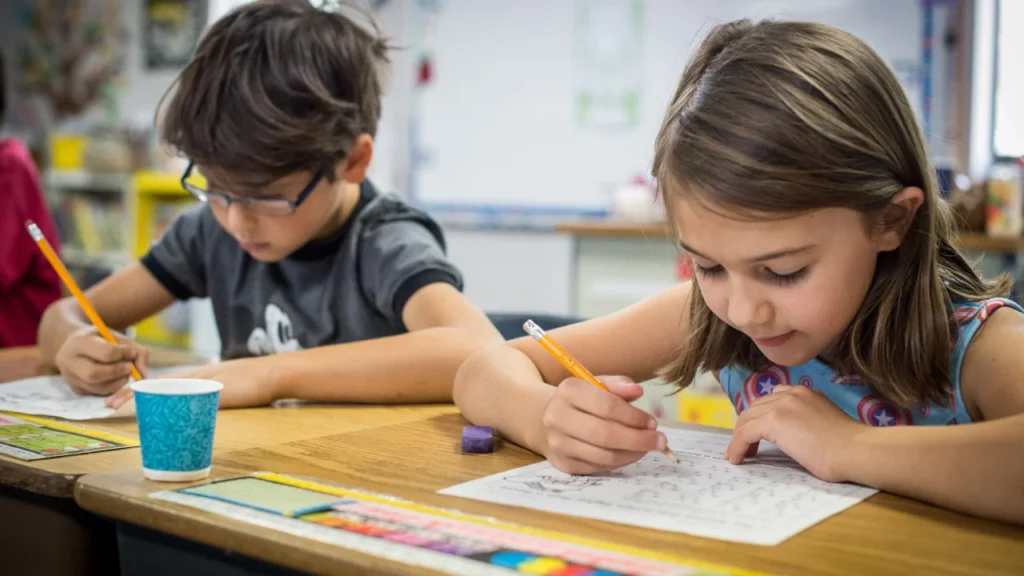![Unlocking Growth Through Play-Based Learning at Hermitage Hills Day School. Introduction. Play is more than giggles and games. At Hermitage Hills Day School, play is the framework upon which young minds build resilience, curiosity, and confidence. Each block tower toppled […]](https://dayschools.org/hermitage/wp-content/uploads/sites/5/2025/07/Day-School-3.webp)
Table of Contents
Introduction.
Play is more than giggles and games. At Hermitage Hills Day School, play is the framework upon which young minds build resilience, curiosity, and confidence. Each block tower toppled teaches balance and design. Every pretend grocery store visit hones social negotiation skills. In these small, joyful moments, children are developing neural connections that lay the groundwork for complex thinking, emotional regulation, and lifelong learning. Play-based learning is not a break from learning—it is learning, deeply integrated into a child’s natural developmental process.
At Hermitage Hills Day School, the environment is crafted to foster this growth. Materials are carefully chosen to encourage exploration, open-ended thinking, and collaboration among peers. Play transforms the classroom into a dynamic space where discovery is constant, and learning feels like a natural, exciting part of everyday life. By honoring children’s instinct to play, Hermitage Hills Day School nurtures a love for learning that extends far beyond preschool walls.
Parents often notice their children coming home not only with stories of fun but also with noticeable growth in confidence and language. This growth is intentional. Play-based learning at Hermitage Hills Day School is structured yet flexible, allowing each child to progress at their own pace while being guided towards social and cognitive milestones essential for kindergarten readiness and beyond.
What Is Play-Based Learning?
Play-based learning is a dynamic, child-centered approach that blends purposeful play with intentional learning goals. It recognizes that children learn most effectively when they are actively engaged, emotionally connected, and using their hands and minds together. Instead of relying on rigid drills or rote memorization, play-based learning allows children to explore foundational concepts like counting, sorting, storytelling, and problem-solving through engaging activities that feel natural and enjoyable.
At Hermitage Hills Day School, play-based learning is thoughtfully integrated into daily routines and classroom activities. Children are invited to explore, experiment, and discover at their own pace while teachers gently guide them toward developmental milestones. When a child builds with blocks, they are not only strengthening fine motor skills but also learning about balance, weight, and cause and effect. A simple pretend tea party becomes an opportunity for practicing language skills, social turn-taking, and creative thinking as children narrate stories and solve problems together during play.
This approach is rooted in research showing that play stimulates brain development, enhancing neural pathways that support memory, attention, and cognitive flexibility. Play-based learning also encourages curiosity and resilience, nurturing a mindset that embraces exploration and experimentation. At Hermitage Hills Day School, learning through play ensures that children remain fully engaged while building essential academic and social skills. This method prepares children not just for the next academic step but for a lifetime of confident learning, curiosity, and joyful discovery.
Cognitive Growth Through Exploration
Children are natural scientists, exploring their world with boundless curiosity. Play-based learning nurtures this innate drive by providing opportunities to question, test, and discover. At Hermitage Hills Day School, activities are designed to provoke thought and encourage exploration, whether children are investigating how sand flows through funnels or experimenting with color mixing at the art table.
During these playful explorations, children develop problem-solving skills and learn to think critically. They hypothesize outcomes—what happens if I add more blocks to this tower?—and observe the results, gaining firsthand experience with concepts like cause and effect, spatial reasoning, and early mathematics. This investigative mindset lays a strong foundation for academic success, fostering an ability to think independently and approach challenges with confidence.
Additionally, play-based exploration supports memory retention and attention span development. Children who engage in hands-on activities are more likely to retain information and develop a longer focus over time, skills that are crucial for their transition into structured learning environments. At Hermitage Hills Day School, cognitive growth is nurtured not through passive reception but through active participation in the joyful process of discovery.

Building Social Skills Naturally
Social development forms the backbone of early childhood education, and play-based learning provides the perfect environment to nurture these skills at Hermitage Hills Day School. Through play-based learning, children naturally engage in cooperative activities that encourage sharing, negotiation, and conflict resolution in a safe, supportive setting. Whether they are building an elaborate fort with peers or participating in a group storytelling circle, children learn how to express their ideas clearly, listen to others with respect, and work together toward a shared goal.
These daily social interactions are essential for cultivating empathy and reading social cues. During play-based learning, children learn to interpret the emotions of others, manage their reactions, and resolve disagreements calmly. They gain the ability to understand different perspectives, which helps them build the foundations of healthy friendships and positive communication skills. These lessons, practiced through play, translate into greater emotional intelligence and resilience as children grow.
Moreover, play-based learning provides opportunities for leadership and teamwork, essential elements for preparing children for the social dynamics they will encounter in kindergarten and beyond. A child may lead a pretend adventure or coordinate a group building activity, learning to guide peers while also learning the value of listening and compromise. Others learn how to follow directions, contribute ideas, and collaborate respectfully. Hermitage Hills Day School’s commitment to play-based learning ensures these social skills develop naturally and joyfully, giving children the confidence to engage in any group setting and thrive as compassionate, communicative individuals.
Emotional Intelligence Through Play
Emotional intelligence is as vital as cognitive skills for lifelong success, and play-based learning at Hermitage Hills Day School actively nurtures this area of development. Through play, children encounter a range of emotions—joy, frustration, excitement, disappointment—and learn how to navigate them in a supportive environment. They discover how to express feelings constructively, whether it’s through words during a disagreement in a game or through artistic expression at the craft table.
Teachers at Hermitage Hills Day School guide children in recognizing and labeling their emotions, an essential step in developing emotional literacy. By acknowledging feelings within the context of play, children learn self-regulation techniques that help them manage impulses and respond to challenges calmly. These skills are critical not only for school readiness but also for building resilience in the face of future challenges.
Additionally, play-based environments encourage children to develop empathy. As they interact with peers, children learn to understand and respect others’ perspectives, laying the foundation for compassionate behavior. This emotional growth through play equips children with the tools to navigate social situations, handle stress, and build positive relationships, supporting their overall well-being and personal growth.

Creativity and Problem-Solving in Action
Creativity is more than producing artwork—it is the capacity to approach challenges with flexible thinking and generate fresh, innovative solutions. At Hermitage Hills Day School, play-based learning provides the fertile ground children need to cultivate this creativity alongside robust problem-solving skills. Using open-ended materials like blocks, art supplies, and sensory bins, children are encouraged to experiment, invent, and reimagine, transforming everyday objects into tools for exploration and complex reasoning.
During creative play, children naturally encounter obstacles that require thoughtful problem-solving. A block tower that keeps tumbling down prompts them to adjust their design and test new strategies. In a pretend veterinarian clinic, children figure out how to organize tasks or share responsibilities, negotiating roles and learning to adapt to changing scenarios. These real-time experiences teach children to embrace challenges with curiosity, persistence, and an eagerness to try new solutions—skills vital for navigating both academic and everyday life.
Furthermore, creative play supports cognitive flexibility, enabling children to shift perspectives and consider multiple solutions when faced with a problem. This adaptability will serve them well in classrooms and beyond as they learn to navigate an ever-evolving world. At Hermitage Hills Day School, creativity is valued as an essential part of the learning journey, ensuring that children develop critical thinking, collaboration skills, and confidence in their ability to contribute ideas and solve problems creatively. This nurturing environment prepares them to thrive in a future that rewards innovation and thoughtful exploration.
Language Development in Play-Based Environments
Language blossoms in environments where children are encouraged to express themselves freely, and play-based learning at Hermitage Hills Day School provides precisely this setting. During play, children engage in conversations with peers and teachers, expanding their vocabulary and practicing sentence formation. Whether they are narrating a story during pretend play or discussing plans while building with blocks, these interactions are rich opportunities for language growth.
Play-based learning also introduces children to new concepts and words in meaningful contexts. When a child plays with a toy cash register, they learn numerical terms and phrases associated with buying and selling. In a pretend veterinary clinic, they encounter words related to animals and health, reinforcing their understanding through practical use. This contextual learning helps children grasp language concepts more deeply than rote memorization.
Additionally, storytelling and role-playing within play-based environments foster narrative skills and comprehension. Children learn to organize their thoughts, sequence events, and use descriptive language, laying the groundwork for reading and writing. At Hermitage Hills Day School, language development is not confined to structured lessons but is interwoven throughout daily play, ensuring continuous and engaging language growth.
The Role of Educators in Guiding Play
While play-based learning is child-led, the role of educators at Hermitage Hills Day School is vital in shaping and enriching these experiences to maximize growth and discovery. Teachers at Hermitage Hills are trained to observe children’s interests and behaviors during play-based learning, using these observations to introduce new vocabulary, concepts, and challenges that expand the child’s learning journey naturally. They guide exploration with open-ended questions like, “What happens if we build it taller?” or “How could we work together to solve this problem?”
Educators design environments that support play-based learning, intentionally organizing materials and activity centers that stimulate curiosity and creativity. Every aspect of the classroom invites children to engage deeply, think critically, and explore confidently. The setup encourages independence while also ensuring inclusivity, allowing every child to participate fully in the benefits of play-based learning regardless of their learning style or developmental stage.
Beyond facilitating play, educators at Hermitage Hills Day School model essential social and emotional skills within play-based learning contexts. They demonstrate positive communication, problem-solving strategies, and respectful behavior, setting examples for children to mirror in their interactions. This intentional modeling helps children learn empathy, cooperation, and conflict resolution, ensuring that play-based learning becomes a purposeful tool for holistic development. At Hermitage Hills Day School, educators are partners in each child’s journey, using play-based learning to cultivate confident, curious, and capable learners prepared for both school and life.

How Hermitage Hills Day School Implements Play-Based Learning
At Hermitage Hills Day School, play-based learning is woven into the fabric of every day, standing as the foundation of our educational philosophy rather than an add-on. The classrooms are purposefully designed to encourage exploration through play-based learning, with centers that inspire curiosity and creativity. Art corners foster expression, block areas encourage engineering discovery, and sensory tables invite tactile investigation, all reinforcing the benefits of active, hands-on engagement.
Daily routines at Hermitage Hills Day School balance structured learning with ample time for play-based learning, allowing children to follow their interests while still reaching essential developmental milestones. This method integrates learning seamlessly across subjects. A pretend grocery store, for instance, incorporates counting and reading labels while promoting social interaction and teamwork, all within the context of play-based learning that keeps children engaged and excited about learning.
Parents are actively encouraged to support this approach by understanding how play-based learning supports cognitive and social growth and how they can reinforce these practices at home. Teachers maintain open communication, sharing insights and activities that allow families to align their routines with the school’s philosophy. At Hermitage Hills Day School, the commitment to play-based learning ensures children not only develop academically but also cultivate curiosity, creativity, and a lifelong love for discovery. This environment prepares children for kindergarten and beyond by nurturing confident learners ready to explore the world with joy and resilience.
Conclusion.
Play-based learning at Hermitage Hills Day School is more than a teaching method; it is a commitment to nurturing confident, curious, and capable learners. Through purposeful play, children develop cognitive skills, emotional intelligence, creativity, and social competence, laying a strong foundation for academic success and personal growth. Each activity, from building structures to imaginative role-play, is a step towards developing resilient, adaptable individuals ready to thrive in an ever-changing world.
At Hermitage Hills Day School, children are encouraged to explore, question, and discover in a safe, supportive environment that values their individuality and natural curiosity. This approach ensures that learning is joyful and meaningful, fostering a love for exploration that continues throughout their educational journey.
Choosing Hermitage Hills Day School means choosing an environment where your child’s growth is nurtured through the power of play. It is an investment in your child’s present and future, ensuring they develop the skills and mindset needed for lifelong success.



